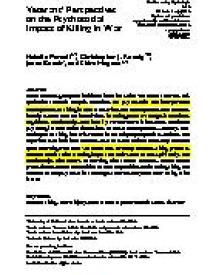Veterans’ Perspectives on the Psychosocial Impact of Killing in War
Based on focus group and individual interviews with 26 combat veterans, this qualitative thematic analysis examines the psychosocial and interpersonal consequences of killing in war. It describes the consequences that veterans identify as most relevant in their lives, including postwar changes in emotions, cognitions, relationships, and identity. Furthermore, it illustrates the linked psychological and social dimensions of those consequences—namely, how the impact of killing in war is rooted in the unique perspectives, actions, and experiences of individual veterans, as well as the social worlds they confront upon returning from war. We found that, for many veterans, killing provokes a moral conflict with a lasting impact on their sense of self, spirituality, and relationships with others. In working with combat veterans, mental health professionals should be sensitive to the complexities of discussing killing and attuned to the psychosocial challenges veterans may face after taking a life in war.
Geachte bezoeker,
De informatie die u nu opvraagt, kan door psychotraumanet niet aan u worden getoond. Dit kan verschillende redenen hebben,
waarvan (bescherming van het) auteursrecht de meeste voorkomende is. Wanneer het mogelijk is om u door te verwijzen naar de bron
van deze informatie, dan ziet u hier onder een link naar die plek.
Als er geen link staat, kunt u contact opnemen met de bibliotheek,
die u verder op weg kan helpen.
Met vriendelijke groet,
Het psychotraumanet-team.
In: Counseling Psychologist ; ISSN: 0011-0000 | 44 | 7 | 1062-1099
https://doi.org/10.1177/0011000016666156


